“Mature discussion” is needed on the continued expansion of the national dairy herd, Minister for Agriculture Charlie McConalogue has said.
The environmental cost associated with increasing output by some farmers cannot be transferred to all other farmers, he warned farmers attending the IFA annual general meeting online on Thursday.
“Significant expansion has occurred in the dairy industry over recent years. I believe we are approaching a need for a mature discussion on the continued focus on additional cows from here on out,” the Minister said.
“The AgClimatise roadmap is based on the premise of a stable herd.
“We must live within our overall climate commitments and, importantly, the environmental cost associated with increasing output by some farmers cannot be transferred to all other farmers,” he warned.
“It will be difficult to achieve stable methane if dairy cow numbers continue to increase over the years ahead,” he warned.
Complacency
He warned that farmers cannot be complacent about the timelines required by the AgClimatise target of climate neutrality by 2050.
Early action is needed by every farmer in the country
“Early action is needed by every farmer in the country if we are to be successful in achieving our climate goals,” he said, adding that the process will require all stakeholders to play their part - referencing the industry, Teagasc and private advisers.
“While there are many asks of farmers, I think the number one thing we need to do is improve nitrogen use efficiency on farm,” Minister McConalouge told the AGM, saying that reducing chemical nitrogen use would improve both the environmental footprint of agriculture and farm profitability.
Carbon farming
The Minister said he was “particularly keen” to explore the whole area of carbon farming, although it would take some time for clarity to emerge on this.
“As you know, it is referenced in the EU Farm to Fork strategy and I will be keeping a close eye on developments in Brussels and beyond in relation to this,” he said.
“We have opportunities to make our increased climate ambitions work for farmers too, especially through measuring and appreciating the excellent work farmers are currently doing in the whole area of biodiversity and the climate.”
New REPS
The Minister has opened a consultation process on the pilot agri environmental scheme, referred to by farmers as the ‘new REPS’.
“I really want to hear from you in the types of measures you’d like to see in that results-based scheme.
“This pilot scheme is crucial, as results-based initiatives will be central to the next CAP,” he told farmers at the AGM.
IFA: Cap on dairy herd 'very, very concerning'
IFA dairy chair Tom Phelan called on the Minister to clarify his position on the future growth of the dairy sector.
“Are you talking about capping [the herd] and why cap the one sector that can deliver a farm income for farm families?” he asked.
“Dairy farmers, in the last five years, have spent substantially in their own farms and the rural economy, and rural communities have benefited enormously from that,” he said.
“The processing sector has spent €1.3bn and the rural economy has benefited from the spin-off from that.”
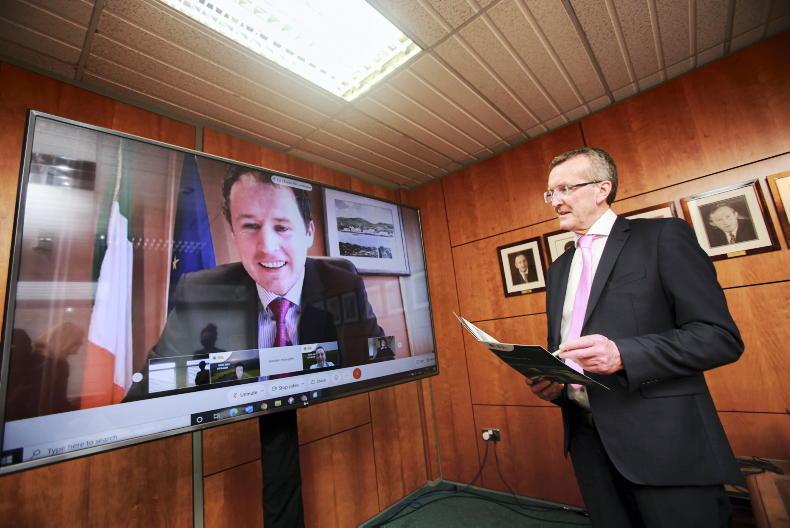
The Minister for Agriculture Charlie McConalogue addressing the 66th IFA AGM. / Karen Morgan
Responding, Minister McConalogue said: “The recent AgClimatise roadmap is based on a stable herd. We have seen Irish agriculture become more efficient in terms of the inputs that are put in and in terms of the outputs.
“But, if overall the herd is increasing, then it's going to be very, very challenging for us to be able to actually overall reduce emissions and every sector is going to have to play a part in relation to climate change.”
If overall the herd is increasing, then it's going to be very, very challenging for us to be able to actually overall reduce emissions
Referring to Teagasc’s work on the MACC curve, he said: “Being able to make those gains through, for example, better nitrogen use, soil fertility, etc, to make those gains and to be able to achieve reductions, the AgClimatise is based on the concept of a stable herd.
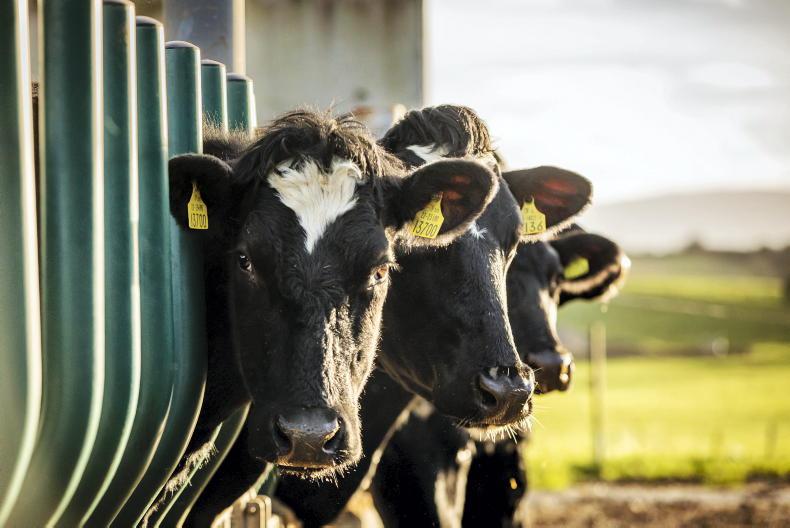
“That's a conversation that you will be central to and that we have to discuss and one that has to be has to be done in collaboration,” he said, adding that he had fought hard for special recognition of the economic and social role of agriculture, and the recognition of the particular characteristics of methane.
However, he added: “Every sector has to make a contribution.”
IFA president Tim Cullinan also called on the Minister to clarify his position on the national herd.
“We need to know you and your Department’s position on this [the herd],” he said, adding that in excess of €2bn had been pumped into the dairy sector by farmers and more by co-ops.
“In the programme for government, it was acknowledged that we need to relook the way methane is accounted for,” he said. “This is a major concern out there.
“This is serious concern for all as an association, particularly as this is one of the sectors where there is a margin in it. It’s very, very concerning for us.”
No magic solution
Minister McConalogue responded by reiterating his earlier points: “The AgClimatise document makes clear that for those measures and those gains to be made in relation to, for example, types of urea, better use of organic nitrogen, etc, that those gains will only be realised in the context of [a] stable herd.
“I don’t have a magic solution running around how we achieve that, president, but it's something that we have to have a discussion on.
“Because, if the rest of the economy is making a contribution, we can be increasing overall emissions in the agri food sector, we have to be making a contribution.
“The AgClimatise document outlines how we can do that and it's based on the concept of a stable herd.”
“Mature discussion” is needed on the continued expansion of the national dairy herd, Minister for Agriculture Charlie McConalogue has said.
The environmental cost associated with increasing output by some farmers cannot be transferred to all other farmers, he warned farmers attending the IFA annual general meeting online on Thursday.
“Significant expansion has occurred in the dairy industry over recent years. I believe we are approaching a need for a mature discussion on the continued focus on additional cows from here on out,” the Minister said.
“The AgClimatise roadmap is based on the premise of a stable herd.
“We must live within our overall climate commitments and, importantly, the environmental cost associated with increasing output by some farmers cannot be transferred to all other farmers,” he warned.
“It will be difficult to achieve stable methane if dairy cow numbers continue to increase over the years ahead,” he warned.
Complacency
He warned that farmers cannot be complacent about the timelines required by the AgClimatise target of climate neutrality by 2050.
Early action is needed by every farmer in the country
“Early action is needed by every farmer in the country if we are to be successful in achieving our climate goals,” he said, adding that the process will require all stakeholders to play their part - referencing the industry, Teagasc and private advisers.
“While there are many asks of farmers, I think the number one thing we need to do is improve nitrogen use efficiency on farm,” Minister McConalouge told the AGM, saying that reducing chemical nitrogen use would improve both the environmental footprint of agriculture and farm profitability.
Carbon farming
The Minister said he was “particularly keen” to explore the whole area of carbon farming, although it would take some time for clarity to emerge on this.
“As you know, it is referenced in the EU Farm to Fork strategy and I will be keeping a close eye on developments in Brussels and beyond in relation to this,” he said.
“We have opportunities to make our increased climate ambitions work for farmers too, especially through measuring and appreciating the excellent work farmers are currently doing in the whole area of biodiversity and the climate.”
New REPS
The Minister has opened a consultation process on the pilot agri environmental scheme, referred to by farmers as the ‘new REPS’.
“I really want to hear from you in the types of measures you’d like to see in that results-based scheme.
“This pilot scheme is crucial, as results-based initiatives will be central to the next CAP,” he told farmers at the AGM.
IFA: Cap on dairy herd 'very, very concerning'
IFA dairy chair Tom Phelan called on the Minister to clarify his position on the future growth of the dairy sector.
“Are you talking about capping [the herd] and why cap the one sector that can deliver a farm income for farm families?” he asked.
“Dairy farmers, in the last five years, have spent substantially in their own farms and the rural economy, and rural communities have benefited enormously from that,” he said.
“The processing sector has spent €1.3bn and the rural economy has benefited from the spin-off from that.”

The Minister for Agriculture Charlie McConalogue addressing the 66th IFA AGM. / Karen Morgan
Responding, Minister McConalogue said: “The recent AgClimatise roadmap is based on a stable herd. We have seen Irish agriculture become more efficient in terms of the inputs that are put in and in terms of the outputs.
“But, if overall the herd is increasing, then it's going to be very, very challenging for us to be able to actually overall reduce emissions and every sector is going to have to play a part in relation to climate change.”
If overall the herd is increasing, then it's going to be very, very challenging for us to be able to actually overall reduce emissions
Referring to Teagasc’s work on the MACC curve, he said: “Being able to make those gains through, for example, better nitrogen use, soil fertility, etc, to make those gains and to be able to achieve reductions, the AgClimatise is based on the concept of a stable herd.

“That's a conversation that you will be central to and that we have to discuss and one that has to be has to be done in collaboration,” he said, adding that he had fought hard for special recognition of the economic and social role of agriculture, and the recognition of the particular characteristics of methane.
However, he added: “Every sector has to make a contribution.”
IFA president Tim Cullinan also called on the Minister to clarify his position on the national herd.
“We need to know you and your Department’s position on this [the herd],” he said, adding that in excess of €2bn had been pumped into the dairy sector by farmers and more by co-ops.
“In the programme for government, it was acknowledged that we need to relook the way methane is accounted for,” he said. “This is a major concern out there.
“This is serious concern for all as an association, particularly as this is one of the sectors where there is a margin in it. It’s very, very concerning for us.”
No magic solution
Minister McConalogue responded by reiterating his earlier points: “The AgClimatise document makes clear that for those measures and those gains to be made in relation to, for example, types of urea, better use of organic nitrogen, etc, that those gains will only be realised in the context of [a] stable herd.
“I don’t have a magic solution running around how we achieve that, president, but it's something that we have to have a discussion on.
“Because, if the rest of the economy is making a contribution, we can be increasing overall emissions in the agri food sector, we have to be making a contribution.
“The AgClimatise document outlines how we can do that and it's based on the concept of a stable herd.”



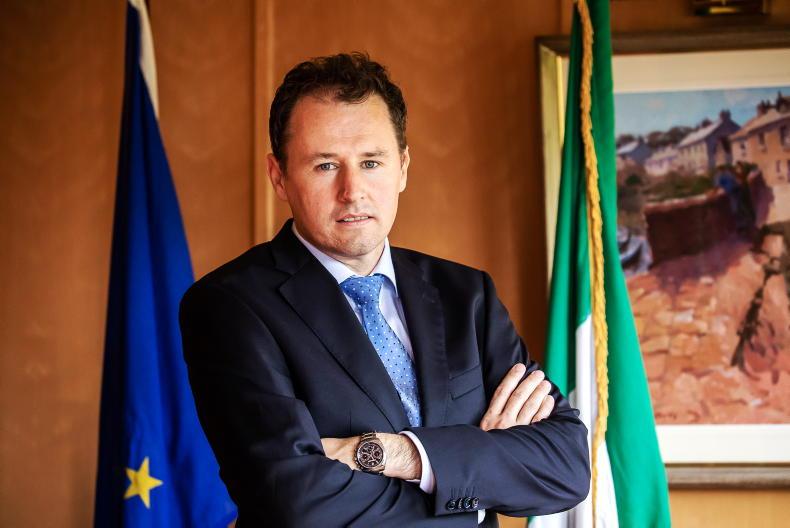




 This is a subscriber-only article
This is a subscriber-only article









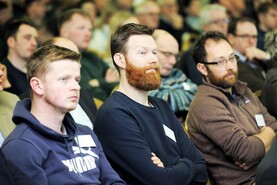
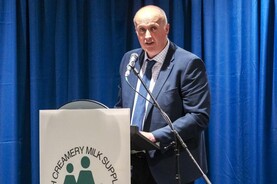
SHARING OPTIONS: